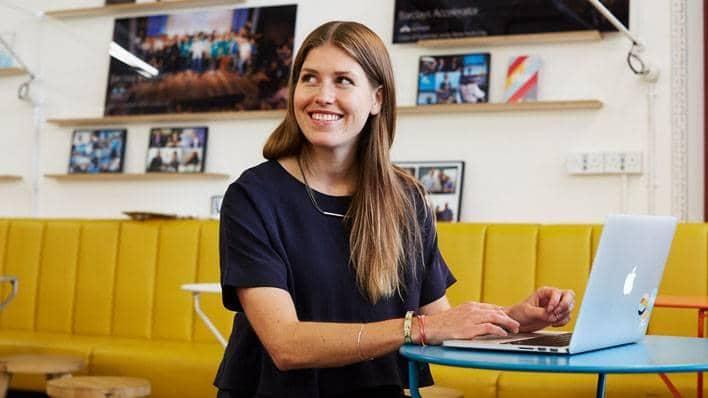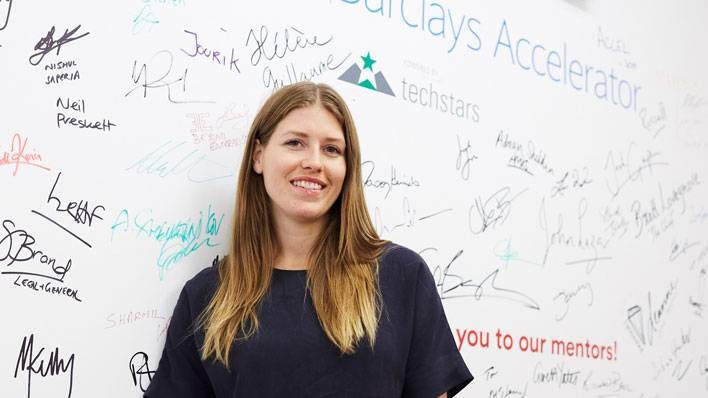
How Barclays is waking up to open innovation
“I am very good at brainstorming” says Magdalena Krön, minutes after meeting in the open space of Rise London. Situated in the East End, in a former department store, the centre is open plan and gently buzzing with the activity of a dozen fresh companies. Some may go on to become fintech superstars.
Krön – recently named as one of Business Insider’s ‘40 coolest people in UK fintech’ – serves as Head of Rise London and is Vice President of Open Innovation at Barclays. “I have many hats,” she notes, but one way to sum up her role is “to look after the start-up ecosystem and connect that into Barclays innovation”.
At first glance you wouldn’t know which side of the bridge between start-up and corporate she was standing on. Dressed simply in a blue t-shirt and jeans, 31-year-old Krön looks more tech entrepreneur than banker. Of the scores of people wandering around the office’s football pitch sized space, weaving from coffee station to breakout area, there isn’t a suit or tie to be seen. Krön fits in. She has an unusual dual perspective: knowledge of the problems banks need to solve, and access to the enterprises that can solve them. “I’ve never been a hardcore developer though,” she says, “I call myself a wannabe hacker.”
Krön looks around the space and says that she, Barclays, and the young entrepreneurs around her “constantly have to adapt. Technology moves on really fast, but there’s always an opportunity to just…start. It’s about knowing where to start.”
“It’s so important for Barclays to continue building,” she continues. “I go out a lot into the start-up environment and we’re already seen as a very innovative bank, so how can we support that message going forward? With Rise we do it in a slightly different way and that adds even more to the differentiation from other financial institutions.”
Before joining Barclays, Krön worked for entrepreneur support organisation Capital Enterprise: “In my two years there I saw more than 400 start-ups on a one-to-one basis. I was building up a service connecting start-ups and investors.” Add to that the 60 fintechs she sees from the long-list of each Accelerator programme, and it’s clear that Krön has built up significant experience of dealing directly with fintech start-ups.

Krön is also founder of the London chapter of GeekGirl Meetup, a community for women working in tech, start-ups and design
She also knows what it’s like from the other side: "After university I came out with all this knowledge and started building my own company for two years”, she says. “I reached a point where I knew the team wasn’t right – this is one of the classic lessons - they were literally teaching this in the programme, saying ‘Choose your team wisely, it’s like getting married and you have to be prepared to spend the rest of your life with these people.’ But anyway. I still wanted to work with entrepreneurs, with start-ups.”
“Money never starts an idea; it’s the idea that starts the money”
Krön answers instantly when asked whether she still sees herself as an entrepreneur: “Yes. I think it’s about being a doer. And being OK with challenging the current establishment of things. That’s a lot of what entrepreneurs have to do.” But aren’t banks the establishment? “Banks might have to change the way they think about themselves and consider the impact that technology is having on their business models. That’s a massive shift in mindset for a lot of people who work within the bank. This space is a great example of that: when you bring Barclays people down here you see how their minds are changing.”
There’s an old adage that says ‘money never starts an idea; it’s the idea that starts the money’. Does Krön find it difficult incorporating the entrepreneurial mindset into a large corporate? “The idea behind Rise is recognising that not all innovation happens within our own four walls. There are so many ideas among the start-up community, so it’s important to challenge the traditional internal way of doing things. By forcing yourself into a start-up’s shoes, you absolutely have to start thinking differently.”
More and more people from the bank have been coming the few miles from Canary Wharf to the East End to get involved. “This is interesting because it’s changed in the last year and a half,” Krön explains. “Corporates have seen that there’s an opportunity here and we have to grab it. And that happens in more mature ecosystems. Initially the system is driven by passionate entrepreneurs who are going out and trying to get corporate clients and customers, but those clients are not in their world. But now so many corporates run accelerator programmes, innovation labs, and are finding different ways to work better with start-ups, because for many companies this is the new R&D function.”
Light and shade
Krön was born and raised in Umeå, a Swedish university town eight hours drive north of Stockholm. “We have pretty much darkness 24 hours a day in the winter time, but 24 hours light in the summer months, which is amazing.”
Learning to manage the contrasts of light and shade could have been good training to balance the different surroundings of seed companies and big business. Moving to London, a spell in retail at H&M followed (“so I didn’t leave Sweden completely”) and after travelling, Krön completed a UCL undergraduate degree, then a masters in technology entrepreneurship – the ideal tuition to bring into her current role.
It’s noted that a next-generation version of Krön might not have the same opportunities. “You can see Europe has really enabled people to move around and try different things. The experiences I had were invaluable to me and I don’t regret at all not starting to build my career immediately. It was interesting to come into university having made a very conscious choice of what I wanted to do and I was excited about studying and excited about technology. I also had experience in managing people - while my peers were more there to have fun and explore their first time out of home – and I’d done that already.”
In Krön’s observation, London has been uniquely placed in fintech, with a range of “big topic” specialisms – AI, machine learning, blockchain, cybersecurity, payments – which she likens to “a tray of cookies”, because “you can ask me to choose one, but I can actually eat them all”. She adds: “What’s been so great is that there wasn’t that much here a few years ago. There were meetups, but not much. Now everything’s happening here.”
GeekGirl guide
Part of that excitement is due to one of Krön’s other ‘hats’, as the founder of the London chapter of GeekGirl Meetup, a community for women working in tech, start-ups and design. “We showcase women who do awesome stuff, who control incredible projects across the tech industry. I think that’s a big achievement and I hear stories from people who come back to us and say going to a GeekGirl Meetup actually changed their life. They decided to take the leap and do their own start-up or decided to change career path and they got that confidence through meeting other women who were thinking the same thing.”
With one foot in tech and the other in finance, two worlds where the gender balance is notoriously poor, Krön remarks “I want to say there have been improvements, but I’ll say there’s some way to go. There are a lot of strong women within fintech, but when you go to fintech events, it’s still mainly men.”
Magdalena Krön, with her presence and her actions, is helping to change this and she’s loving the process: “Put a Barclays colleague in a room with a start-up that they’ve never spoken to before, and they come out and say ‘Oh wow. I did not know that you could have such passion for what you do.’” They come out of the room more passionate and more … curious. And curiosity is the beginning of developing a true innovation mindset.”